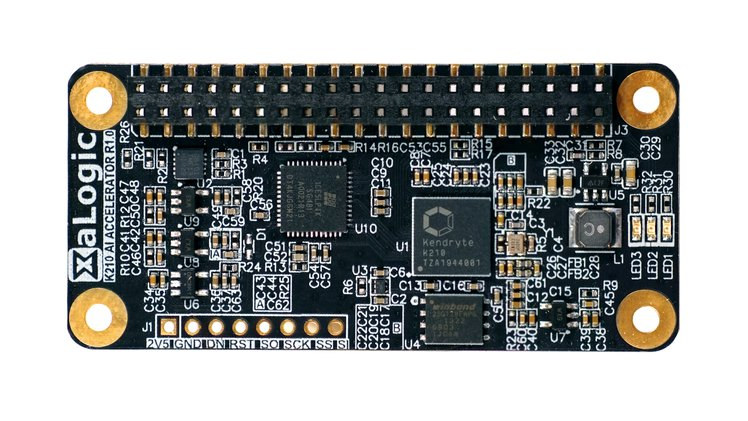There’s a relatively small but active maker community in Thailand, and we’ve covered or even reviewed some made in Thailand boards including ESP8266 and ESP32 boards, a 3G Raspberry Pi HAT, and KidBright education platform among others. MakerAsia has developed CorgiDude, a board based on the version of Sipeed M1 RISC-V AI module with built-in WiFi, and part as a kit with a camera and a display used to teach machine learning and artificial intelligence with MicroPython or C/C++ programming. CorgiDude board specifications: AI Wireless Module – Sipeed M1W Module with Kendryte K210 dual-core 64-bit RISC-V RV64IMAFDC CPU @ 400Mhz with FPU, various AI accelerators (KPU, FFT accelerator…), 8MiB on-chip SRAM Espressif ESP8285 single-core 2.4 GHz WiFi 4 SoC plus IPEX antenna connector Storage – MicroSD card slot Camera I/F for 2MP OV2640 sensor up to 1280 × 1024 (SXGA) @ 30 fosm SVGA @ 30 fps, or CIF @ […]
K210 AI Accelerator Raspberry Pi pHAT targets secure AIoT projects (Crowdfunding)
Kendryte K210 is a dual-core RISC-V AI processor that was launched in 2018 and found in several smart audio and computer vision solutions. We previously wrote a Getting Started Guide for Grove AI HAT for Raspberry Pi using Arduino and MicroPython, and XaLogic XAPIZ3500 offered an even more compact K210 solution as a Raspberry pi pHAT with Raspberry Pi Zero form factor. The company is now back with another revision of the board called “XaLogic K210 AI accelerator” designed to work with Raspberry Pi Zero and larger boards with the 40-pin connector. K210 AI Accelerator board specifications: SoC – Kendryte K210 dual-core 64-bit RISC-V processor @ 400 MHz with 8MB on-chip RAM, various low-power AI accelerators delivering up to 0.5 TOPS, Host Interface – 40-pin Raspberry Pi header using: SPI @ 40 MHz via Lattice iCE40 FPGA I2C, UART, JTAG, GPIOs signals Security Infineon Trust-M cloud security chip 128-bit AES […]
Linux 5.9 Release – Main Changes, Arm, MIPS & RISC-V Architectures
Linus Torvalds has just announced the release of Linux 5.9 on lkml: Ok, so I’ll be honest – I had hoped for quite a bit fewer changes this last week, but at the same time there doesn’t really seem to be anything particularly scary in here. It’s just more commits and more lines changed than I would have wished for. The bulk of this is the networking fixes that I already mentioned as being pending in the rc8 release notes last weekend. In fact, about half the patch (and probably more of the number of commits) is from the networking stuff (both drivers and elsewhere). Outside of that, the most visible thing is a reinstatement of the fbdev amba-clcd driver – that’s a noticeable patch, but it’s basically just mainly a revert. The rest is really really tiny (mostly some other minor driver updates, but some filesystem and architecture fixes […]
RISC-V & ESP32 based TTGO Handheld T-WATCH K210 AIoT DevKit Works with a 9V Battery
LilyGO TTGO T-Watch K210 AIOT is a rather thick watch development kit based on Kendryte K210 RISC-V AI Processor and ESP32 WiSoC capable of performing AI workloads such as face detection using a USB power source. We first covered the development kit in June, and the company releases some small variants from time to time with the latest being TTGO Handheld T-Watch K210 with basically the same hardware, plus the addition of a handle that adds a power button, and a compartment for a 9V battery to power the watch/devkit. TTGO Handheld T-Watch K210 specifications: SoC – Kendryte K210 dual-core 64-bit RISC-V processor with 8MB RAM, AI accelerators Storage – 16MB flash, MicroSD card slot Display – 1.54-inch capacitive touch IPS screen connected over an 8080 interface Camera – Adjustable 2MP OV2640 sensor with 65-degree lens (optional 120-degree angle lens), AS312 “human” infrared sensor Connectivity – 2.4 GHz 802.11b/g/n WiFi […]
Sipeed Maix Amigo is a Portable 64-bit RISC-V AI Development Kit with Display and Cameras
Earlier this year, Seeed Studio introduced Wio Terminal a portable Arduino devkit with an LCD display, and expansion connectors and headers. The company is now selling a similar looking devkit but for different applications with Sipeed Maix Amigo portable 64-bit RISC-V development kit powered by Kendryte K210 RISC-V AI processor and equipped with an LCD display, two cameras, a few buttons, and several I/O headers and Grove connectors. Sipeed Maix Amigo specifications: SoC – Kendryte K210 Dual-core 64-bit RISC-V (RV64GC) processor with FPU @ 400 MHz (overclockable to 500MHz), 8MB SRAM, built-in AI accelerators for video and audio Storage – 16MB Flash, MicroSD card slot up Display – 3.5-inch TFT capacitive touch screen display with 480×320 resolution Camera VGA front-facing camera up to 30 fps (GC0328 sensor) VGA rear camera up to 60 fps (OV7740 sensor) Audio – Build-in microphone, optional 6-mic array USB – 1x USB Type-C port for […]
Linux 5.8 Release – Main Changes, Arm, MIPS, and RISC-V Architectures
Linus Torvalds has just released Linux 5.8: So I considered making an rc8 all the way to the last minute, but decided it’s not just worth waiting another week when there aren’t any big looming worries around. Because despite the merge window having been very large, there really hasn’t been anything scary going on in the release candidates. Yeah, we had some annoying noise with header file dependencies this week, but that’s not a new annoyance, and it’s also not the kind of subtle bug that keeps me up at night worrying about it. It did reinforce how nice it would be if we had some kind of tooling support to break nasty header file dependencies automatically, but if wishes were horses.. Maybe some day we’ll have some kind of SAT-solver for symbol dependencies that can handle all our different architectures and configurations, but right now it’s just a manual […]
Linux 5.7 Released – Main Changes, Arm, MIPS and RISC-V Architectures
OK… I’m a bit late on that one. Linus Torvalds released Linux 5.7 last week: So we had a fairly calm last week, with nothing really screaming “let’s delay one more rc”. Knock wood – let’s hope we don’t have anything silly lurking this time, like the last-minute wifi regression we had in 5.6.. But embarrassing regressions last time notwithstanding, it all looks fine. And most of the discussion I’ve seen the last week or two has been about upcoming features, so the merge window is now open and I’ll start processing pull requests tomorrow as usual. But in the meantime, please give this a whirl. We’ve got a lot of changes in 5.7 as usual (all the stats look normal – but “normal” for us obviously pretty big and means “almost 14 thousand non-merge commits all over, from close to two thousand developers”), So the appended shortlog is only […]
TTGO T-Watch K210 / K210 AIOT Watches Perform Face Detection with Kendryte K210 RISC-V Processor, ESP32 WiSoC
After covering ESP32 based TTGO T-Watch-2020 programmable watch last month, I noticed LilyGO launched “TTGO T-Watch K210 AIOT” watch with Kendryte K210 RISC-V AI SoC and a camera for face detection and recognition, and while searching for information, I discovered another apparently similar “TTGO T-Watch K210“. But let’s look into the specifications to find out what the differences are. I first came across TTGO T-Watch K210 AIOT, so let’s have a look at some preliminary specifications for this model: AI Processor – Kendryte K210 RISC-V Dualcore 64bit with FPU with 8MB SRAM Storage – 16MB QSPI flash, MicroSD card socket Display I/F – FPC connect for external display (not included) Camera – 2MP OV2640 sensor Audio – MAX98357A Audio codec; CVSD & SBC audio encoding Connectivity – 2.4 GHz 802.11b/g/n WiFi 4 up to 150 Mbps, Bluetooth 4.2 BR/EDR and BLE Debugging – USB-C port via CP2104 Expansion UART, SPI, […]









